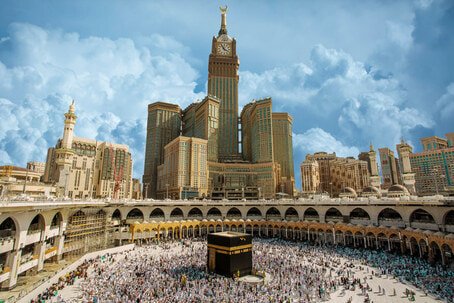Makkah is the heart of Islam, a city that resonates with divine presence, history, and sacred significance. While the Kaaba and Masjid al-Haram remain the central focus for every pilgrim, engaging in ziyarat in Makkah provides a profound spiritual connection. These visits enrich the Umrah or Hajj experience by allowing pilgrims to immerse themselves in the history and legacy of Islam.
Ziyarat is more than sightseeing—it is an act of devotion, remembrance, and reverence for the Prophet ﷺ, his companions, and key moments in Islamic history.
What Does Ziyarat Mean in Islam?
The term “ziyarat” translates to “visiting” in Arabic. In an Islamic context, it refers to visiting sites of religious, historical, or spiritual significance, especially those linked to the Prophet ﷺ, his family, or his companions.
While Tawaf and Sa’i are obligatory rituals, ziyarat is a recommended Sunnah for pilgrims seeking a deeper understanding of Islam. It allows you to connect emotionally with the sacred past and draw inspiration from the Prophet’s ﷺ life and teachings.

Top Ziyarat Sites to Visit in Makkah
Here are some key locations every pilgrim should include in their ziyarat journey:
1. Jabal al-Noor (The Mountain of Light)
Home to Ghar Hira, the cave where the Prophet Muhammad ﷺ received the first revelation from Jibreel (AS). Many pilgrims climb this mountain to reflect on the transformative moment that marked the beginning of Islam.
2. Jannat al-Mu’alla (Cemetery of Makkah)
This sacred cemetery houses the graves of many of the Prophet’s ﷺ family members, including Khadijah (RA). Visiting this site allows for quiet contemplation and gratitude for those who contributed to the early Islamic legacy.
3. Ghar Thawr (Cave of Thawr)
Located south of Makkah, this cave sheltered the Prophet ﷺ and Abu Bakr (RA) during their migration (Hijrah) to Madinah. The story of the spider’s web and dove’s nest here highlights Allah’s protection and divine guidance.
4. Masjid Aisha (Masjid at-Tan’eem)
A key miqat point where pilgrims, including Aisha (RA), entered ihram to perform Umrah. Pilgrims often visit this mosque to renew their ihram while staying in Makkah.
5. Jabal al-Rahmah (Mount of Mercy)
Situated in Arafat, just outside Makkah, this mountain holds deep significance. It is where the Prophet ﷺ delivered his final sermon during Hajj, offering pilgrims a profound sense of unity, humility, and reflection.
Why Ziyarat in Makkah is Important
Engaging in ziyarat provides several spiritual benefits:
- Strengthens emotional connection to the Prophet ﷺ
- Deepens understanding of early Islamic history
- Enhances love and respect for Islamic teachings
- Increases iman and mindfulness during Hajj or Umrah
- Leaves pilgrims with lasting spiritual impressions beyond rituals
Ziyarat transforms a pilgrimage into a reflective and heartfelt journey, far beyond a simple visit to historical sites.
How to Plan Your Ziyarat in Makkah
Pilgrims can arrange ziyarat tours through:
- Licensed Umrah & Hajj operators
- Hotels offering shuttle and guided services
- Trusted local taxi drivers with knowledge of ziyarat locations
Most ziyarat trips are half-day excursions and can be booked as private tours or small groups. Early booking is recommended during Ramadan or Dhul-Hijjah to avoid overcrowding.
Muslim Umrah Taxi – Your Partner for Ziyarat Tours
Muslim Umrah Taxi provides guided, respectful, and comfortable transportation for pilgrims wishing to explore ziyarat sites in Makkah. Features include:
- Private, air-conditioned vehicles
- Courteous English and Urdu-speaking drivers
- Flexible schedules with minimal crowds
- Visits to all major ziyarat sites
- 24/7 support for families, solo travelers, or groups
This service ensures that your spiritual journey is smooth, safe, and focused on reflection rather than logistics.
Conclusion: Experience the Soul of Makkah Through Ziyarat
Ziyarat in Makkah offers more than sightseeing—it is a journey that touches your heart, strengthens your faith, and connects you to the legacy of the Prophet ﷺ. Every cave, mosque, and mountain carries a story of devotion, courage, and guidance.
To truly experience Islam and deepen your connection with Allah, take time to explore these sacred sites. Let your ziyarat become a source of reflection, gratitude, and inspiration that remains with you long after you leave the holy city.

